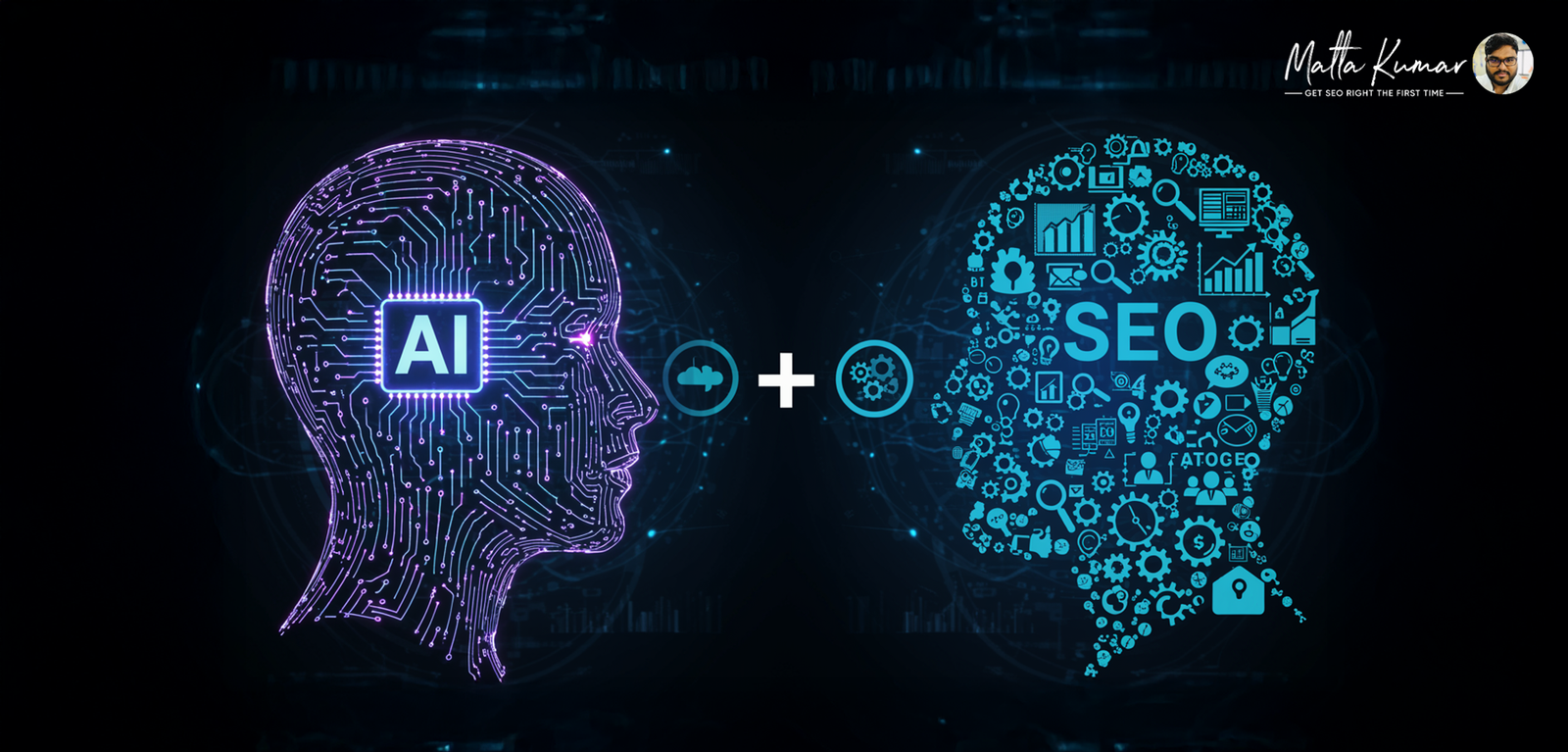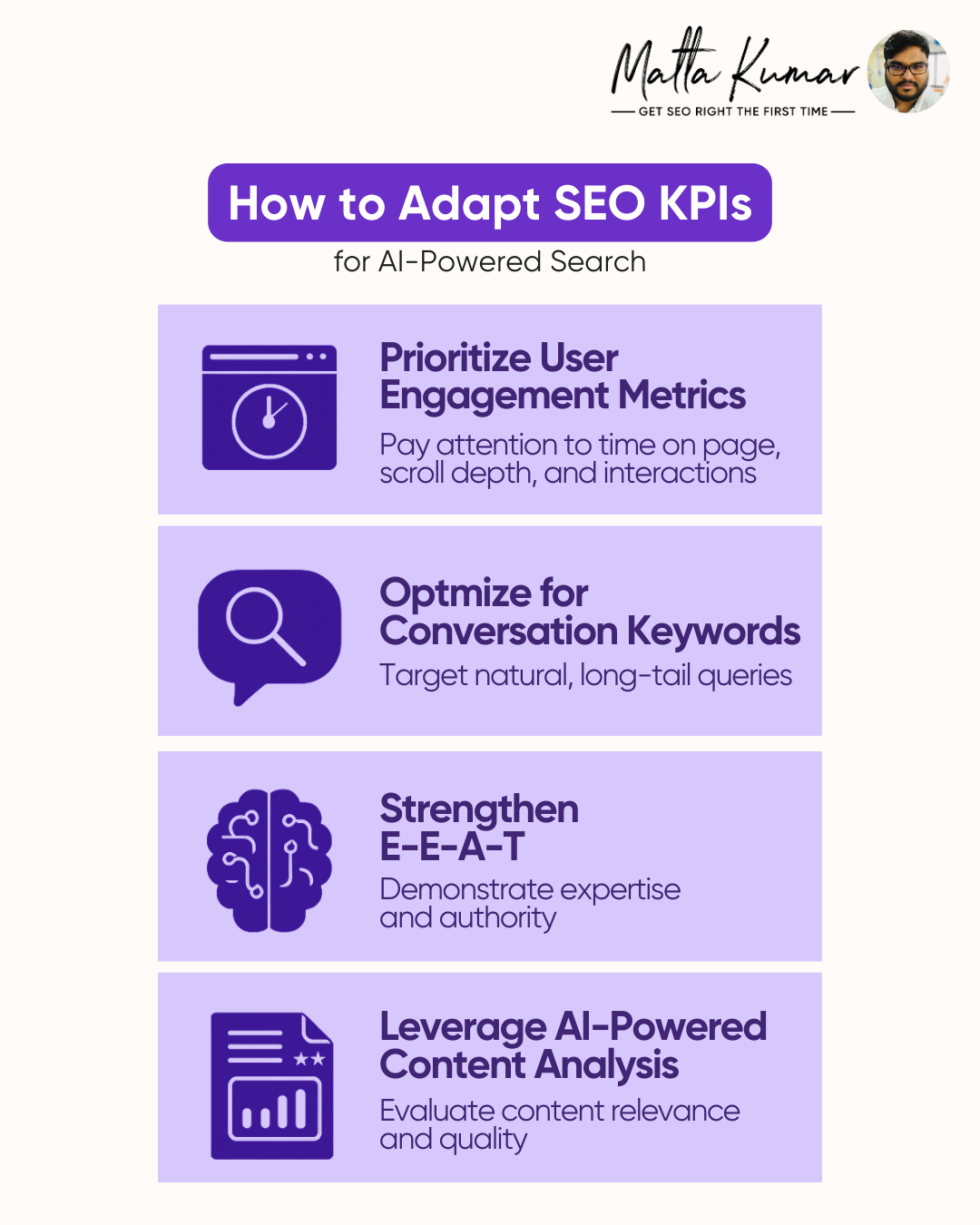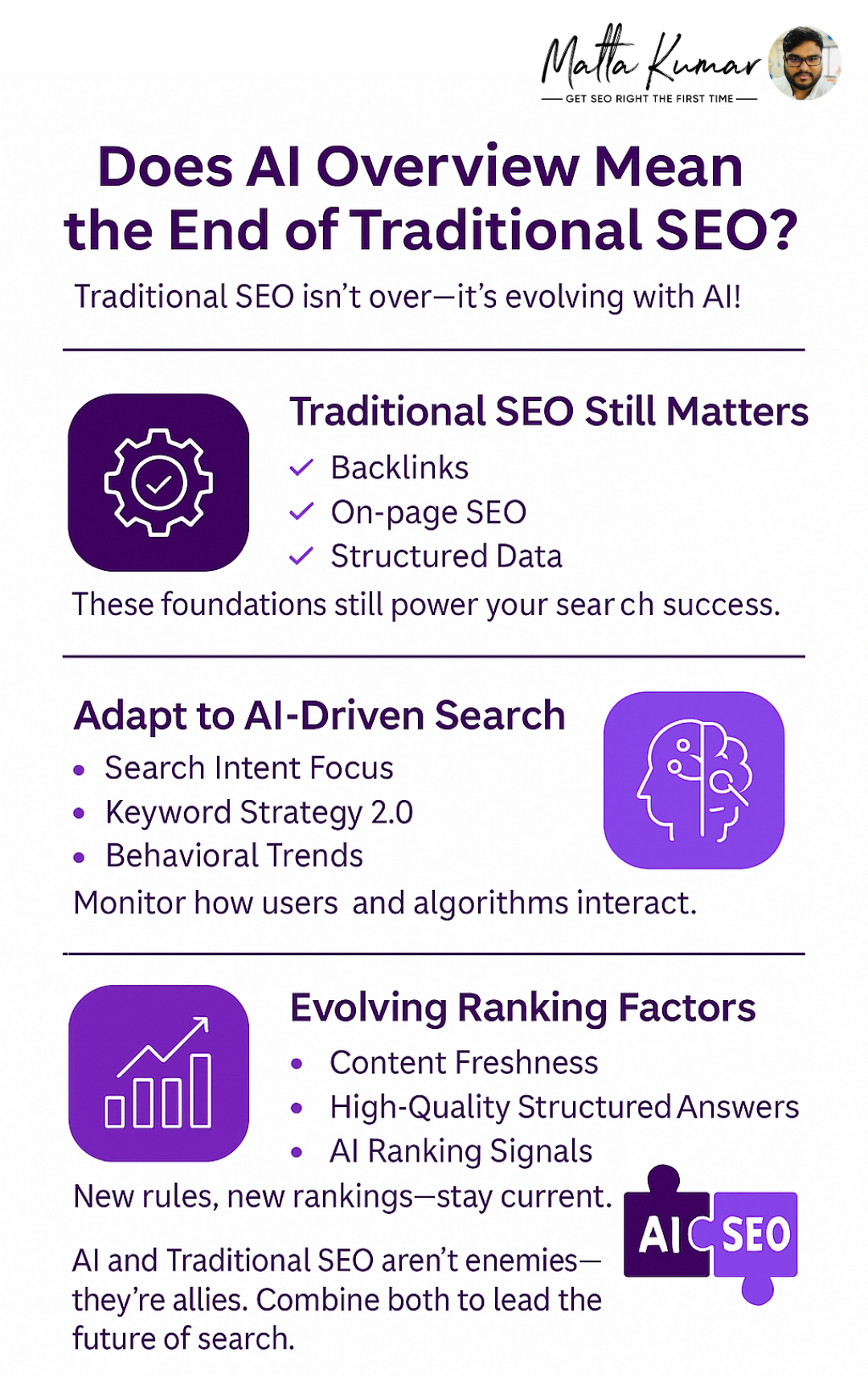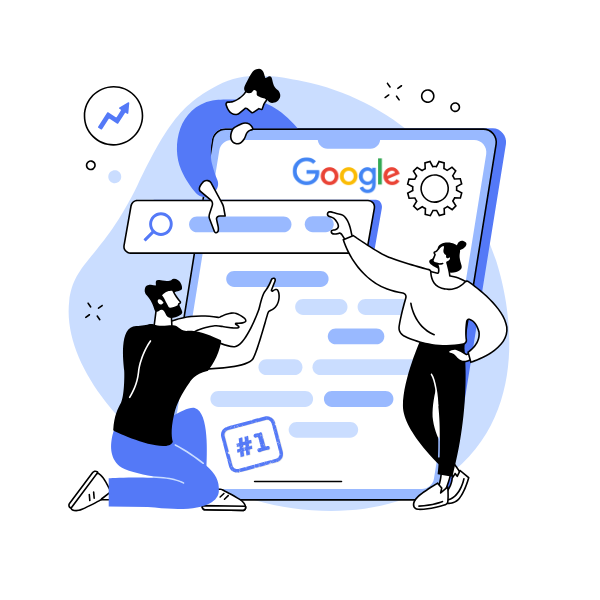Organic search has a long and promising portfolio of success in terms of high ROIs, yet many brands’ underinvestment in organic search paints a different narrative today. Small—to medium-sized companies invest 10x more on paid campaigns for quick results than SEO. The latter’s long-term benefit is wholly overlooked in their chase for prompt gains. Therefore, its true potential remains largely untapped.
The paradigm shift is primarily driven by users’ preferences for instant, contextual, and personalised responses over traditional search listings.
Unarguably, AI has altered traditional search algorithms, and its impact is felt by companies, from loss in their website rankings to lesser traffic and virtual footfalls. Machine learning and natural language processing are used in search engine optimisation (SEO) to teach generative search engines like Google AIO to understand human speech patterns, imitate expertly, and provide results that match user intent more aptly. Thus, search results are made more relevant to users. Elevated user experience and engagement are expected to drive more website traffic and convert successfully into more sales.
AI in search engine algorithms always considers user behavior by evaluating different search patterns and identifying trends so customers can get accurate search results. Additionally, these intelligent engines are taught to read and categorise different content better, such as text, images, and videos. The benefit is primarily for users as they get a highly personalised, engaging experience. The latter is the sole purpose for which AI models are trained to accentuate the objective of search engines.
Therefore, AI-driven search optimisation is key to synthesising information from multiple sources. How does this impact traditional SEO?
Artificial Intelligence is a new rage now and has been for a while. Every online narrative includes a context on such cutting-edge technologies, which are gradually slipping into daily virtual interactions. News headlines on AI spelling doomsday for humans, in general, are genuine concerns, and so is the lack of regulations surrounding it. However, the debate about AI taking power from humans can be shoved back because the tidal waves it is triggering within SEO and organic search are happening now. And if you have a business to run in the competitive digital space, this news should concern you more than the possible future human extinction.
That said, the new technology is not driving SEO out of business, as is generally believed. AI adds more value to SEO by matching results with user intent. In this context, one thing that requires round applause is Google’s attempt to elevate the search experience for users with its changing algorithms.
Google is rightfully named as the search engine giant for a reason. The search engine’s market share still stands at 90.14% in 2025. Take a closer look at how the company has worked relentlessly to convert its search engine into the best assistant for users over the years. You will understand the diverse algorithm changes its team has worked to put together and present the most optimal product on a silver plate. From RankBrain to Neural Networks, BERT and MUMs, Google Lens to AI Overviews, Google’s experiment with cutting-edge technology remains unmatched.
Agreed, the frequent changes in the search algorithm frustrate marketers. However, from a positive perspective, such changes help customers and companies by enabling the latter to be found more easily.
Now, coming back to AI in search engine algorithms, Google AIO and other generative engines are shifting their priority from traditional backlinks, domain authority, and other traditional SEO ranking factors to more contextual content relevance. This change can easily cut through all the noise online, bringing the targeted audience straight to your doorstep.
Here are a few examples to pinpoint the role of AI Overview in content freshness, refined search results, and streamlined SEO practices and strategies.
Search engines like Google permit AI-generated content that doesn’t condone illegal activities, misinformation, spam, abuse, or explicit content. When it comes to quality assessment, Google’s ranking system prioritises high-quality material to retain the relevance and credibility of the information shared. Using AI to manipulate search rankings through low-quality material generation in bulk will award stringent measures as this approach directly stands in the line of fire, deemed as a straight violation of Google’s spam policies. Additionally, marketers often use ChatGPT to streamline SEO-friendly content production and distribution. But blindly relying on the tool whose preprogrammed model is based on datasets up to 2021. Real-time content optimisation should involve an expert in the loop to keep the information fresh and updated.
Consequently, AI-driven content strategies must factor in content freshness and user experience to remain relevant.
Google has always leveraged AI-driven search optimisation to refine search results. Here, AI algorithms are extensively used to analyse search history, user behavior, and location to understand the intent better and deliver more personalised results. This shift aligns with AI Overview SEO best practices. The latter gives more importance to content relevance and context for different user segments.
Businesses can use AI-powered chatbots to enhance search experiences. These chatbots collect valuable data, influence search engine algorithms, and refine SEO strategies for you. Moving forward, structured data and semantic SEO will become pivotal for ensuring that content remains well-organised and easily discoverable.
AI-powered predictive analytics help you anticipate search trends and user preferences. Predictive solutions’ integration helps optimise SEO efforts and keep them updated according to organic search trends. AI-driven insights can refine strategies based on emerging search patterns to elevate content quality and relevance.
Additionally, you can use the same predictive analytics to identify gaps in current SEO strategies. Thus, content helpfulness is improved, and information remains fresh and valuable. The proactive approach enables marketers to adjust their tactics before trends shift, thus spelling a sustainable SEO success for the business.
AI-driven tools automate various aspects of SEO, while marketers focus on strategy rather than manual tasks. AI-powered LLMs now handle keyword research, market analysis, and content optimisations. For example, AI Overview keyword research tools provide insights into competitive keywords. Thus, ranking strategies are refined more easily than before. Additionally, the tools are leveraged to analyse other aspects of SEO, including web performance, user experience, and structured data. All of these parameters directly impact the search rankings of your website. Furthermore, AI Overview content optimisation techniques enhance content credibility, maintain PageRank, and ensure better visibility in generated search overviews.
In the end, Gen AI’s main purpose is to ensure content remains authoritative, user-focused, and algorithm-friendly. Therefore, SEO strategies should be adjusted to fine-tune with AI Overview search intent for better results.
The bottom line is that despite the appearance of variability in AI Overviews in search queries, it will ultimately drive the inevitable change, and search engines will only get better and more valuable. The fire between AI and search will not be subdued; instead, it will expand at a compound rate after fine-tuning its algorithms across specific segments, like search quality, the flow of traffic in its ecosystem, and monetisation (ads). It will get exponentially better over time.
Here’s a pro tip for businesses: Brace yourselves and stay prepared for the rapid transition in organic searches and SEO tactics to stay afloat in the competitive market.
Through AI Overviews content optimisation and essential tactics, additionally, focusing on optimising online assets according to generative engines’ search algorithms, aka GEO, can truly power your pages for higher rankings and enhanced visibility. However, an important thing to remember here is getting your content featured in AIO will be strikingly different from ranking pages on the same platform.
The following snapshot highlights the differences in tactics between ranking on AIO and getting featured.
Ranking in AI Overviews can be tricky, and at times, the traditional SEO ranking approach might not be enough to boost your pages higher up in the search query overview. Google AI Overviews and other generative search engines work differently than traditional ones. Hence, understanding some key terminologies, their differences, purposes, and benefits will help businesses optimise their websites and leverage the extended user network to boost the awareness and recognition of their offerings, ultimately leading to more sales.
Google AI Overviews is a generative AI feature of the search engine giant. It aims to enhance search results through concise, AI-generated summaries comprising key information at the top of search pages. Users can avoid clicking through multiple links to get quick and direct answers in the shape of brief summaries extracted from various relevant sources.
This feature is handy for users looking for quick insights. With AI Overviews, users can further explore information through linked sources cited in the answer.
The myth about Google AI Overview and generative engines planting the seeds of destruction for SEO is finally broken because, unlike popular belief, these AI-driven searches are not the latter’s replacement. Agreed. Companies now have to reframe their online marketing plan according to generative engine optimisation rules; thoughtful SEO and content marketing can still walk hand-in-hand to enhance the overall strategy. Their successful integration, however, demands a blend of creativity and technical knowledge.
Both can complement each other to drive the following outcomes:
By now, you are aware of traditional SEO KPIs that include:
Each of these continues to hold tremendous value in the Gen AI era. However, their interpretation and optimisation require an upgrade.
AI-driven search optimisation, reshaping search results, emphasises user experience, contextual relevance, and natural language processing (NLP) that measure performance effectively. However, some important considerations require your immediate attention:
Search engines have evolved with artificial intelligence to interpret user intent more precisely. The sole reliance on keyword density has been replaced with semantically rich, contextually relevant content fine-tuned to AI and organic search trends.
AI is capable of generating vast amounts of content. However, cutting through all the noise requires quality content, which has emerged as a primary ranking factor in the Gen AI era. High-value, informative, and engaging content enhances user experience; thus making content a critical element for AI Overview optimisation.
Voice search continues to grow, thus drawing enterprises’ attention to optimise their online presence for natural language queries and conversational search patterns. Both are pivotal for AI Overview search intent and overall SEO success
AI tools are leveraged to analyse real-time trends, user behavior, and ranking factors in AI Overviews. This element can only help businesses to develop data-driven SEO strategies.
AI continues to transform search engine algorithms. Now is not the time to hibernate, thinking keyword-focused SEO practices will be enough to keep your business afloat in a competitive, AI-driven digital market. An immediate shift from traditional keyword-focused SEO to a more context-aware, user-centric approach is needed by seamlessly adapting AI Overview ranking factors. A slight change in the SEO game plan is enough for enterprises to get noticed in Google AI Overviews.
Ai Overviews ranking factors differ slightly from traditional SEO; hence, adapting the difference into your existing SEO framework will create magic. Businesses can enhance their visibility in AI-powered search results through intelligent articulation of key metrics in their strategy that boost website performances in generative searches.
Check whether the following points are included in your search engine optimisation blueprint or not:
AI Overviews are all the rage now, and the spotlight is directly on user engagement and quality content. Therefore, tracking deeper engagement indicators like time on page, pages per session, and scroll depth highlights the AI Overview user experience for your website.
Generative engines like ChatGPT allow conversational interaction between the platform and users. Your website or content pages should align with long-tail conversational keywords. Begin your strategy by first monitoring the performance of your online assets
for natural language queries and voice search rankings. This will ensure a clean alignment with AI-driven search optimisation.
Your online content should align with Google’s quality guidelines. This is achieved through credibility and expertise demonstration. They are critical in AI Overview PageRank.
Organisations should use smart AI tools to assess the readability, relevance, and content freshness of their online assets. This is the only way to align digital assets with AI Overview SEO best practices.
How do AI Overviews influence your search performance? This is an important question to answer. You can do so by analysing Google Search Console data and tracking user engagement metrics on pages where AI-generated summaries appear simultaneously. Focus on changes in impressions, clicks, and click-through rates (CTR) for keywords impacted by AI-driven search optimisation. Comparing pre- and post-implementation data will help identify trends while monitoring on-page engagement, which will reveal how users interact with content when AI Overviews are present.
Keyword Performance: You can use Google Search Console data to identify keywords where AI Overviews frequently appear and analyse impressions, clicks, and CTR fluctuations. This will indicate whether AI-generated content draws traffic away or complements your rankings.
Traffic Sources: Evaluate whether users are still clicking through to your site or engaging more directly with AI Overview search results. This insight helps refine your SEO strategies for AI search.
Timeframe Comparison: Compare your performance before and after the introduction of Google AI Overviews to detect shifts in traffic, rankings, and user behavior.
User Engagement Metrics: Track time on the page, bounce rate, and scroll depth for pages where AI-generated answers appear. This will determine whether users interact with your content beyond the AI Overview summary.
CTR from AI Overviews: If measurable, monitor the number of users who click through from an AI Overview to your website. This reflects the effectiveness of your content in driving organic visits.
Search Query Alignment: Examine the search queries that trigger AI Overviews to ensure they align with your target audience and content strategy.
User Feedback: Gather insights from users about their experience with AI-driven search results, particularly whether they find the AI-generated content sufficient or prefer to visit your site for more details.
Some key considerations in the AI-Powered Search Landscape include:
As AI in search engine algorithms continues to evolve, the long-term effects of AI Overviews on organic search trends are still unfolding.
Even as AI Overviews influence search intent, high-quality, in-depth content remains essential for ranking in AI Overviews and maintaining authority.
While direct AI Overview SEO best practices are yet to be defined, optimising for structured data, content freshness, and user intent can improve your chances of appearing in AI-enhanced search results.
With the rise of Google AI Overviews, businesses must adapt their SEO strategies for AI search to maintain visibility and traffic. While traditional SEO principles remain essential, AI in search engine algorithms has introduced new ranking factors, changing how brands optimise their content. Understanding the impact of AI on SEO can help businesses refine their approach to AI-driven search optimisation and stay ahead in the evolving search landscape.
Appearing in AI Overviews increases visibility, positioning your brand as an authoritative source. Users trust AI-generated content, leading to enhanced brand credibility and recognition.
When your content ranks in AI Overviews, it gains higher exposure, increasing organic search trends and traffic. Businesses must focus on AI Overview content optimisation to secure these prime search positions.
AI-driven search optimisation can influence paid ad performance by improving user trust. A brand featured in an AI Overview may see increased engagement, leading to better ad efficiency and conversions.
As stated before, the rise of generative search engines like Google AI Overviews doesn’t necessarily sound like the end of traditional SEO. Instead, a new era has dawned where Gen AI can coexist with organic search to deliver 10x better user search experience and a new opportunity for businesses to rank higher on the competitive ladder as thought-leaders of their respective industries. In the end, however, the latter success is spelled by their innovative approach to blending the traditional search engine optimisation strategies with the new rules of AI and effectively dominating the changing dynamics of online marketing.
The following points are significant in the same context for businesses trying to scale their online presence while keeping up with the change that cutting-edge technologies are driving.
While AI Overview SEO best practices require new strategies, traditional SEO elements like backlinks, structured data, and on-page optimisation remain critical.
AI and organic search trends are essential elements to monitor. These trends will help you reframe your keyword research and content according to search intent and adapt to evolving search behaviors effectively.
With AI Overview ranking factors now influencing search visibility, businesses must prioritise factors like AI Overview content freshness, quality, and structured data for better placement.
Content remains the king of digital marketing. High-quality content is the dataset, the much-needed oil on which generative AI engines run. However, quality, authority, reliability, and informative content are prioritised over all the noise on digital media. The following points will help businesses understand the present demand for the type of content to be generated to attract more eyeballs on generative search engines for company websites.
Businesses should publish well-researched, credible content that aligns with AI Overview content PageRank and expertise-driven SEO. These steps will enable enterprises to rank in AI Overviews.
AI-driven search optimisation rewards easily read and structured content for quick consumption. For example, bullet points, headers, and concise paragraphs enhance the readability of your content with AI generative tools. Your copy materials online should comply with the above-mentioned ground rules for catching more attention than before.
Regular updates are mandatory to improve AI Overview content freshness. AI Overviews and other generative search engines prioritise fresh and relevant content. Make sure that the material you share online, as part of your content marketing strategy, remains relevant, fresh, and authentic to increase your brand’s chances of retaining top search positions.
Subtle changes in your overall approach to organic searches and SEO strategies can positively impact results on generative search engines. Adopt the best practices and witness 10x more success with AI SEO.
Your keyword research needs a complete revamp especially when AI Overviews dominate organic search results. So begin your journey by identifying AI-friendly search terms and aligning them with AI Overview search intent. This will serve as a promising starting point for optimising content accordingly and get noticed easily.
Ensure high readability, well-structured formatting, and in-depth information to meet AI Overview content quality standards.
Schema markup improves AI Overview structured data recognition. This will help increase your brand’s chances of appearing in AI-powered search results more frequently.
Enhancing engagement through better navigation, fast-loading pages, and mobile-friendly design improves AI Overview user experience and visibility.
A flexible marketing approach allows businesses to adapt seamlessly to changes in organic searches. Here are a few takeaways for brands to master SEO in the Google AI Overviews era, get discovered easily by their target audience, and strengthen their positions as thought leaders in the industry.
SEO is evolving, and businesses must embrace AI-driven search optimisation to stay competitive.
AI-powered search algorithms will favour content directly answering user queries with AI Overview content helpfulness.
A consistent and continuous practice of updating your SEO strategies for AI search has become non-negotiable. You can use AI tools and AI Overview content reviews to track performance and make data-driven improvements.
AI-driven search transforms the SEO landscape, requiring businesses to adapt their strategies to align with Google AI Overviews. Optimising for structured data, intent-driven content, and AI-friendly formatting is now essential to maintaining visibility and traffic. While traditional SEO remains relevant, success in an AI-powered search environment depends on embracing new ranking factors, tracking AI-driven SEO KPIs, and focusing on high-quality, structured content. By integrating AI-driven search optimisation into their approach, businesses can stay ahead of evolving organic search trends and maintain a competitive edge in the digital marketplace.





















